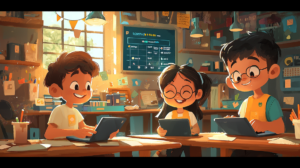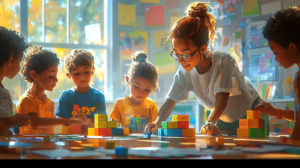by maelle
Share
by maelle
Share

In today’s rapidly evolving educational landscape, it is crucial to find engaging and effective methods for helping children learn, as this fosters both enthusiasm and intrinsic motivation. Traditional educational methods often struggle to captivate young learners, especially given the digital distractions and fast-paced lifestyle that today’s children experience.
Educational games provide an effective way to bridge this gap, uniquely combining fun with skill-building. These games are not only entertaining but are also essential tools for fostering important developmental skills in children, including confidence, resilience, problem-solving, and social abilities.
Educational games have transformed the way children perceive and approach learning, giving them opportunities to explore, experiment, and apply knowledge in an engaging way.
For example, math games with timed challenges can help reinforce arithmetic skills, while spelling competitions enhance literacy. Science games might allow children to explore concepts through interactive simulations, enabling them to visualize and understand topics that could seem abstract in traditional settings.
This gamified approach encourages children to view educational achievements with the same enthusiasm as a game-based victory, transforming education from a task into an exciting journey.
This article delves into how educational games benefit child development, the impact of competition on skill-building, and structured strategies for fostering a positive and balanced competitive spirit in young learners.
The Role of Educational Games in Child Development
Educational games have evolved into critical tools for child development, supporting growth across cognitive, social, and emotional dimensions.
By engaging children in structured yet playful scenarios that challenge reasoning and analysis, these games teach children to think critically, solve problems, and make informed decisions. Educational games foster an active learning environment that helps children build skills essential for lifelong success.
Games that feature logical puzzles or decision-making scenarios teach children that creativity and persistence are key in problem-solving. They may also demonstrate that working with others often yields better outcomes than working alone.
For instance, a cooperative math puzzle game could require each player to complete different parts of a puzzle, reinforcing the idea that individual contributions combine to achieve a shared goal. Interactive games encourage children to develop a growth mindset, showing them that patience and teamwork often lead to solutions.
Beyond cognitive development, educational games also play a pivotal role in social and emotional growth. Many games are designed to build interpersonal skills, as they require players to interact, take turns, or strategize together.
In team-based games, children are not only learning academic content but are also practicing empathy, patience, and cooperation as they work toward a common goal. These skills extend beyond gaming and contribute to their overall ability to thrive in social environments, whether in school, on a sports team, or with family.
The cognitive benefits of educational games include improved memory, attention, and logical reasoning as children practice these skills in engaging, low-stress environments.
Emotionally, educational games encourage children to regulate their emotions, cope with both successes and setbacks, and experience the thrill of achieving a goal after hard work.
The competitive nature of some games introduces children to the feelings associated with winning and losing, teaching them to handle both gracefully. This balanced approach to learning helps children become well-rounded and resilient individuals.
Visit our article to know more about Empowering young minds enhance learning

Benefits of Using Games for Learning
One of the standout advantages of educational games is their capacity to increase motivation and engagement, transforming learning into a process that is both enjoyable and effective. Unlike traditional teaching methods, which can feel monotonous or rigid, educational games introduce an element of excitement, personal involvement, and reward.
These games allow children to explore ideas, test their knowledge, and absorb information through hands-on experience, creating a lasting impact on comprehension and retention.
Educational games are designed to accommodate different learning styles, making them accessible to a diverse range of children. Visual learners may engage more effectively with games that offer colorful graphics or animations, while kinesthetic learners benefit from interactive, touch-based activities.
Games also provide personalized learning experiences, allowing children to progress at their own pace and celebrate their unique successes. For instance, some children may find a spelling game with quick feedback helpful, while others thrive in strategy-based science games that allow them to plan and experiment. The flexibility of these games helps ensure that each child feels recognized and capable of success.
Additionally, many educational games incorporate elements like rewards, challenges, and feedback loops that keep children motivated and driven to continue progressing. These elements encourage intrinsic motivation, showing children that learning itself is a rewarding process.
Games create a positive feedback loop where achievement fuels further engagement, encouraging children to strive for continuous improvement. This helps children develop confidence in their abilities, as they associate learning with both enjoyment and accomplishment.
The intrinsic motivation fostered by these games supports a lifelong love for learning that extends well beyond the classroom, helping children grow into curious, self-driven individuals.
The Impact of Competition in Educational Games
Introducing competition into educational games can further enhance engagement, motivation, and cognitive development by encouraging children to set goals, measure progress, and celebrate achievements.
Competition teaches children to test their skills against others, fostering a healthy sense of ambition and a desire to improve. Educational games that feature leaderboards, rewards, or score-based rankings tap into this desire, motivating children to push themselves while still enjoying the activity.
Competition also allows children to build essential social skills, including empathy, adaptability, and cooperation. In multiplayer games, children learn to collaborate, share strategies, and work toward a collective outcome, fostering essential social abilities.

For instance, in a team-based challenge, children may need to communicate their ideas, delegate tasks, and encourage each other to succeed. These interactions help children develop respect for their teammates and empathy toward their opponents, building the foundations of strong social relationships and mutual respect.
The dynamics of competitive gameplay introduce children to both success and setbacks in a safe, controlled environment. By learning to handle victories with humility and losses with resilience, children build the adaptability and emotional intelligence necessary for facing challenges.
In these settings, competition also becomes a character-building experience, preparing children to approach real-world obstacles constructively. Through competitive play, children develop valuable life skills, such as the ability to view setbacks as opportunities to learn and grow, ultimately equipping them for success both in and outside the classroom.
Types of Competitions in Educational Games
Educational games offer various competition formats that cater to different skill levels, preferences, and developmental needs. Cooperative games focus on teamwork, encouraging players to work together to achieve shared goals, which fosters communication, collaboration, and a sense of unity.
In a cooperative game, every player’s contribution is valued, as each task completed by an individual brings the team closer to achieving the final goal. Such games teach children that success often requires collaboration and that pooling resources and ideas can lead to better results than working alone.
Solo challenges, on the other hand, encourage children to push their boundaries independently, fostering resilience and self-confidence. Individual challenges allow children to set personal goals, track progress, and celebrate individual achievements, helping them build a sense of independence and self-reliance.
Role-playing games add another dimension to learning by enabling children to experience scenarios from different perspectives, fostering empathy and social awareness. By assuming the roles of diverse characters, children gain insights into various viewpoints, learning that every individual brings unique strengths and ideas.
These varied competition types allow educational games to cater to diverse learning needs and provide children with multiple pathways for exploring their abilities.
Whether through team-based play or solo achievements, these games support children’s cognitive, social, and emotional growth, offering a comprehensive developmental experience that prepares them to interact effectively in different social and personal contexts.
Explore the Child Mind Institute’s insights on how playful learning and interactive games support children’s cognitive and emotional growth.
How Competition Enhances Learning
Competition can significantly enhance learning by providing children with structured opportunities for skill development, feedback, and self-regulation. By setting goals and striving to achieve them, children cultivate a growth mindset, recognizing that effort and persistence lead to improvement.
Games with timed challenges or score-based feedback encourage children to think critically, make quick decisions, and adjust strategies—all skills that are valuable in academic and personal development.
The feedback loops in competitive games are particularly beneficial, as children learn to assess their strengths and weaknesses in real-time. For example, a child who struggles with a specific game level may try different approaches, ultimately mastering the challenge through perseverance.
This iterative process of trial and error teaches children resilience, demonstrating that mistakes are a natural part of growth. Engaging in competitive educational games also helps children develop accountability and self-regulation, as they learn to evaluate their performance and make adjustments.
These experiences foster lifelong learning habits and encourage a problem-solving attitude that prepares children to face both academic and personal challenges.
Building Confidence through Competition
Competitive educational games build confidence by giving children opportunities to demonstrate their skills, confront challenges, and experience pride in their achievements.
By participating in games with competitive elements, children learn to push their limits, embrace challenges, and celebrate their successes, which strengthens their self-efficacy. Over time, these experiences reinforce children’s belief in their abilities, helping them approach future tasks with confidence and optimism.
As children encounter both victories and setbacks in games, they develop a strong sense of self-awareness and adaptability that serves them well in various areas of life. Confidence gained from competitive games is not limited to the gaming environment; it extends to other settings, such as academics and social situations.
Children who experience success in games are more likely to approach other challenges with resilience and a positive outlook. By building a foundation of self-assurance, competitive games encourage children to pursue their goals with enthusiasm and determination.
Visit our article here Boosting emotional-intelligence with interactive games
Practical Tips for Encouraging Healthy Competition
Encouraging healthy competition is essential for ensuring that educational games remain constructive and beneficial learning experiences. Parents and educators can promote a positive view of competition by emphasizing effort over results, showing children that growth matters more than winning.
By celebrating each child’s unique progress and achievements, adults can reinforce that personal improvement matters most, regardless of outcome.
Incorporating teamwork into competitive games is another effective way to foster cooperation. Games that include team-based challenges encourage children to work together toward common goals, shifting the focus from individual success to collective achievement.
This focus on shared objectives helps children see competition as a positive, supportive experience, reducing the pressure associated with winning or losing and emphasizing the value of collaboration.
Creating a Positive Environment for Competition
Creating a positive environment for competition in educational games supports emotional intelligence, empathy, and respect. Clear guidelines and a culture of encouragement help children approach competition constructively.

Educators can model good communication and active listening, teaching children to articulate their feelings and reflect on their experiences within the game. This practice reinforces social awareness and emotional intelligence, helping children build resilience in handling both victories and setbacks.
Team-building activities alongside competitive games also create a supportive atmosphere where children can view competition as a means of growth rather than stress.
These activities reinforce the importance of cooperation, empathy, and mutual support, helping children recognize and celebrate the strengths of their peers.
Teaching Good Sportsmanship and Discipline
Good sportsmanship in competition fosters emotional intelligence, resilience, and respect. By emphasizing values like fairness, respect, and humility, educators help children view competition as a means for personal growth.
Sportsmanship teaches children to handle both success and disappointment with grace, reinforcing that the journey of learning and improving is more valuable than the final result.
This focus on good sportsmanship builds a positive competitive spirit, motivating children to learn from their experiences and build social skills that extend beyond the gaming experience.
Children who learn sportsmanship become more empathetic and cooperative, building a foundation for teamwork and community.
Potential Risks of Competition in Educational Games
While competition in educational games has many benefits, it is important to acknowledge potential risks, including stress and unhealthy rivalry. If not managed well, competition may negatively affect children’s self-esteem or increase pressure to win.
Balancing competition with cooperation and a focus on personal growth ensures that educational games remain positive learning tools.
In cases where competition becomes overwhelming, educators can provide support by encouraging children to view each experience as a learning opportunity, regardless of outcome.
Integrating collaborative elements within competitive games helps maintain a balanced approach, emphasizing that shared success is just as valuable as individual accomplishment.
LearningWorks for Kids offers resources and recommendations on educational games that support social, emotional, and cognitive growth through play.
Addressing Negative Effects and Balancing Competition
Balancing competitive elements with collaboration, self-reflection, and personal growth keeps competition constructive. Educators can set achievable goals, reward incremental progress, and encourage intrinsic motivation, helping children engage positively with competition.
Self-reflection after games helps children recognize their emotional responses, building resilience and self-awareness.
By fostering both competition and cooperation, educational games support holistic development, preparing children to face challenges with confidence, adaptability, and empathy. This balanced approach equips children to become lifelong learners, ready to thrive in both academic and social environments.
FAQ
What are educational games and how do they benefit kids?
Educational games are games designed to teach specific skills or knowledge to children. They benefit kids by making learning more engaging and interactive, allowing them to practice and apply their knowledge in a fun and challenging way, enhancing their cognitive skills and encouraging problem-solving.
How does competition in educational games help build confidence in kids?
Competition in educational games can help build confidence in kids by providing them with a sense of achievement and accomplishment when they succeed. It also motivates them to keep trying and improving, leading to a boost in their self-esteem and fostering resilience and perseverance.
What are some examples of educational games that incorporate competition?
Some examples of educational games that incorporate competition are math games that have a timed element or require players to earn points by solving problems, spelling games that have a leaderboard for top scorers, and science games that have challenges or quizzes to test knowledge and skills, promoting cognitive development and learning outcomes.
Can competition in educational games have a negative impact on kids?
Yes, if not managed properly, competition in educational games can have a negative impact on kids. It can lead to excessive pressure and stress, causing kids to give up or lose interest in learning. It’s important for parents and educators to monitor and regulate the level of competition in these games by promoting positive reinforcement and self-regulation.
How can parents and educators use competition in educational games to benefit kids?
Parents and educators can use competition in educational games to benefit kids by setting achievable goals and rewards, encouraging teamwork and collaboration, and emphasizing the importance of learning and growth rather than just winning. This helps in developing adaptability skills and intrinsic motivation.
Are there any other benefits of competition in educational games besides building confidence?
Yes, competition in educational games can also improve critical thinking skills, decision-making abilities, and problem-solving skills in kids. It can also promote healthy social skills and sportsmanship if played in a positive and supportive environment, fostering learning resilience and growth mindset.
Conclusion
Educational games offer engaging, interactive ways to enrich learning for children, harnessing gamification and competition to foster skill-building and personal growth. By combining fun with educational value, these games create immersive, personalized experiences that make learning both enjoyable and impactful.
Whether through solo challenges or collaborative play, educational games are powerful tools for developing cognitive, social, and emotional skills, empowering young learners to embrace education with confidence and curiosity.
For an engaging start, explore Monkey Learning, a math app designed to teach through fun games and personalized feedback. Begin your child’s learning journey today by visiting the Monkey Learning app on the App Store.
STAY IN THE LOOP
Subscribe to our free newsletter.
Are you in search of an engaging and interactive method to acquaint your children with the realm of music? Your quest ends here. The following discourse will delve into the paramount music educational games that are adept at not only providing amusement to your young ones but also fostering an affinity for music within them. […]
If one is seeking a dynamic and engaging method to cultivate a child’s creativity, there are various art educational games available that can be highly beneficial. For a comprehensive list of the top educational games for children, including those tailored to different age groups and learning styles, check out our article on Top 10 Best […]


